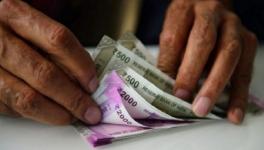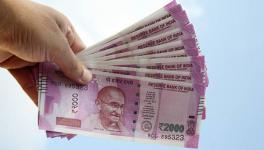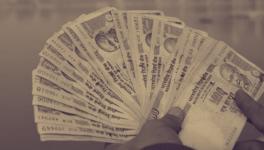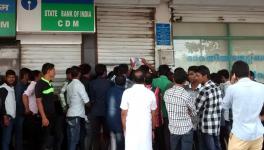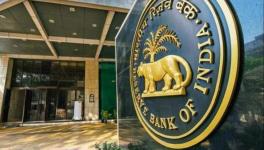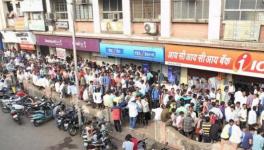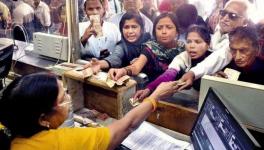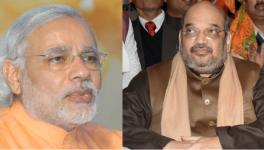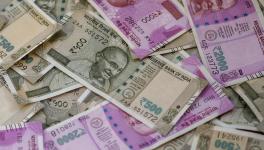Demonetisation: Another Failure of the Modi Government?
Amid woes of customers hit by cash crunch, 25 people have reportedly died while waiting in queue to exchange their currency notes. In Midst of this chaos, one needs to ask who this policy is really affecting. According to the income tax data, the demonetization of Rs 500 and Rs 1,000 banknotes is unlikely to help the government suck out black money from the economy as hoarders keep a tiny portion of their ill-gotten wealth in hard cash. The end result that seems to be coming out, is that the corrupt are unaffected by this scheme while the poor suffer. While the Prime Minister romanticizes the entire situation, the common man starves on the road. Demonetization seems to have no silver lining. Newclick spoke to C.P. Chandrasekhar, Professor CESP JNU. He talks about the concept of black wealth and how the people with most of the black wealth will not be affected by this scheme. He also speaks about the consequences of this move as it is economically not structured well. The introduction of 2000 rupee notes is useless as the smaller denomination notes are not available in the market. Watch the interview for more.
Rough Transcript:
Prabir Purkayastha: Hello and welcome to Newsclick, this program with Real news. Today we have with us C.P. Chandrasekhar and we are going to discuss the recent step of the Government of India to demonetize the 500 rupee and 1000 rupee notes allegedly for stopping black money and terrorist activities, fake currency etc.
How does this actually square with the supposed aims of black money because as has been widely stated a lot of this black money is held in dollar accounts and therefore is not really held as it were in banknotes under the pillow or in the cupboard and so on. So how does this aim of black money control really square with what has been done?
C.P. Chandrasekhar: Well, the way I see it is that there are obvious assumptions that are being made which I am sure even the Government doesn’t really believe. One, of course is the assumption that you are talking about, the fact that the presumption is that black wealth, because it is really not an issue of black money, because you are talking about the black economy, the substantially accumulated black wealth; that black wealth is in the form not of gold or even fixed deposits, investments in real estate and so on, but really sits in the form of money, currency notes even in denominations of 500 rupees because you are talking about a black economy which is so huge; that would mean there are notes buried across the country in order to be able to sustain that. The second assumption which is being made is who was generating this black money is not keeping the money going. The idea is that you make some black money,say you sell some property, you get yourself a certain amount of black money and you sit on it. That’s not the way the black economy operates. So once you say that there are transactions which are taking place on the basis of black money as opposed to black wealth then to the extent that you have money in circulation, which may have originated as black or was black at some point of time in its life, that would have, through transactions moved between the white and black economy many times over. So, if at all you are going to be able to think of anything which you can try and touch, if at all, it’s really going to be the amount of currency which has occurred as a result of very recent transactions, if somebody has just sold, even maybe a DDA flat or something like that and has had to take a certain amount of payment in currency because that’s how a lot of transactions take place and has not yet put it into circulation, then possibly you are going to affect such people but they might not be the principal holders of black wealth and the principal originators of black money in this economy.
Prabir: That’s an interesting point that essentially what/who would be affected are who “tend to hoard” black money due to one- time transactions they might have made and then liquidate this over a period of time. But the big “black money wealth” is really foreign transactions, over-invoicing, under-invoicing, sending money out through hawala channels and as you saw the Panama papers show there’s a huge amount of wealth being stored in the so-called tax havens, which are also in circulation, not that they are hoarded or anything…
C.P.Chandrasekar: That’s an important component but I would suspect that even the sort of rupee black economy and therefore rupee black wealth is quite substantial, which hasn’t actually been transferred to Swiss banks, to the Cayman Islands or where ever. Therefore we are really talking about … even if we talk about that, this is not a measure which is going to affect it and the second assumption which was sort of made is that the white 500s and the white 1000s, particularly the white 500s, because if you take the informal economy, if you take an electrician or a plumber, in the urban areas domestic servants, who gets paid maybe 800 rupees a day, a 1000 rupees a day, even 2000 rupees a day and some who are paid 5000, 6000 rupees a month; they very often are paid in 500 rupee notes. All transactions, the fruit seller on the pavement has gone and paid cash in the morning in order to collect the fruits and then accumulates cash till the evening and then goes back the next morning. These people are sitting with…so I don’t even know these estimates we have whatever, so many per cent, 8%, whatever it is, then another 17% of these notes in circulation, this is held by people you are trying to hit maybe terrorists or financiers of terrorists or black money holders. What you’ve done is you’ve frozen the payments and settlements system in a part of the economy which is a part of the economy which actually is not where these people who you claim you are trying to touch sit. Therefore this is an extremely regressive measure. It is actually a measure unconsciously or because you don’t care has actually hit these people and I don’t believe that there was no inkling of this; that there was no inkling that this is going to create chaos. That just because you’ve set a whole process of transition till Dec. 30th that there isn’t going to be a period of 2, 3, 4 weeks over which there’s going to be complete chaos and as I said freezes the payments and settlements system in this part of the economy.
Prabir: This is the part of the economy which is really the low end of the economic sector: which is the poorer sections who don’t use credit cards, who don’t use electronic transfers and so on. So these are the sections…
C.P. Chandrasekhar: And whose transaction values in a day, in a week are not so large and therefore 500 rupees; you are talking about when the last time we had a demonetization, you are talking about 1000 rupee notes at those prices; a 500 rupee note at today’s prices is just absurd to think that you can actually target it as part of something which should be structurally targeted in terms of the sectors of the economic transactions, you do something about registering properly: prices of real estate for example. So therefore I think this was just a dramatic gesture, this was hype, partly because of the failure of the earlier measure of trying to get people to actually voluntarily declare, paying the penalty, paying the tax: black money nothing came of it, partly because this whole threat that you are going to bring back all this black money and put it in people’s bank accounts hasn’t worked and partly because elections are coming. You just needed some kind of dramatic gesture, the hype, typical of this Government and I think they are so callous that they are not looking at the implications for a section of the population which is already at the margins.
Prabir: This is more in terms of, what you say of managing the optics. We are doing something about black money, hoardings going up all over the country saying, “ brave steps, congratulations to the PM” and so on. So you really think that this is not that black money is being addressed, it’s really the Media and the people being addressed…
C.P.Chandrasekhar: And you have thrown in a bit of corruption and terrorism for good measure.
Prabir: I’ll come from terrorist to money, the fake currency issue which has been raised. Now if you want to address fake currency no need to freeze it for a day like we have done, we can actually change old notes over a period of time and that will take out the fake currency isn’t it?
C.P.Chandrasekhar: If you are talking about people who let’s say are counterfeiting currency in large measure and you tell them, OK I’m going to get you to come and to exchange, obviously they are not going to come. What do they lose? They lose the cost of production of counterfeit currency when they have already put currency and made a lot of money implicitly by putting in counterfeit currency. They sort of retool maybe the same equipment and counterfeit the new currency. So there isn’t even a loss of any significant measure other than …
Prabir: for them. The argument would be that there is a large amount of counterfeit currency going around so we want to take them out of circulation. But for that we don’t need such a freeze. That can be done over a period of time.
C.P.Chandrasekhar: Ya, and in any case this is not going to prevent a new batch of counterfeit currency coming in once you…I do think for example the reason they chose not to put out the new 1000 rupee note is not because of the fact that they had some…it’s just that they are not even able to think of ways of generating very quickly the 1000 rupee note so, people are complaining that you want to take out a certain amount of money from your bank account and when you take it you are getting 2000 rupee notes. And when you go to the market to do transactions; the only way you can do transactions is if those people have 100 rupee notes to give you back or are willing to give up the few 500 rupee notes that they had. So even doing transactions, as I said this fruit vendor if he is stuck with this 2000 rupee note then he goes there, he might have a problem: making his multiple choices of what he wants to buy from different sources. So it’s completely thoughtless and shocking that the state of our nation is such that senior bureaucrats, top members of the central bank, that they can’t actually put their foot down and say: listen, this is almost a Tughlaquian measure.
Prabir: Tughlaq was quite imaginative, the first person in the world to use paper currency. I think it is wrong to call him by the way we do. It seems to be a measure which is bereft of commonsense if I may say so. Apart from the optics there’s also this other issue that there’s 85% of the currency today which is in circulation is 500 and 1000 rupee notes. So doesn’t it mean a huge dislocation for the…
C.P.Chandrasekhar: It’s 85% of the value, in terms of the percentage of notes it’s much more. It’s 85-86% of the total value of the cash in circulation.
Prabir: So essentially you are trying to take out 85% of the cash value in circulation, isn’t it a huge dislocation?
C.P.Chandrasekhar: Obviously. And you are not able to put it back in time; which is what I mean by you are freezing the payments and settlements system. It has a contractionary effect and that contractionary effect I think the burden of it is regressive in terms of the distribution across segments of the population.
Prabir: So it’s going to fall much more…
C.P.Chandrasekhar: Because the people who can do their electronic transactions and so on fall in a different category despite all this Jan Dhan accounts and so on.
Prabir: The only other thing is that the realty companies seem to have suffered more because that’s one sector which is more sensitive to hoarded cash. But apart from that it has not really affected any other sector. Thank you Chandru for being with us and hope to discuss these issues more with you as the time passes. We’ll review these current measures the government is taking with respect to black money and see where it goes. Thank you very much.
DISCLAIMER: Please note that transcripts for Newsclick are typed from a recording of the program. Newsclick cannot guarantee their complete accuracy
Get the latest reports & analysis with people's perspective on Protests, movements & deep analytical videos, discussions of the current affairs in your Telegram app. Subscribe to NewsClick's Telegram channel & get Real-Time updates on stories, as they get published on our website.










